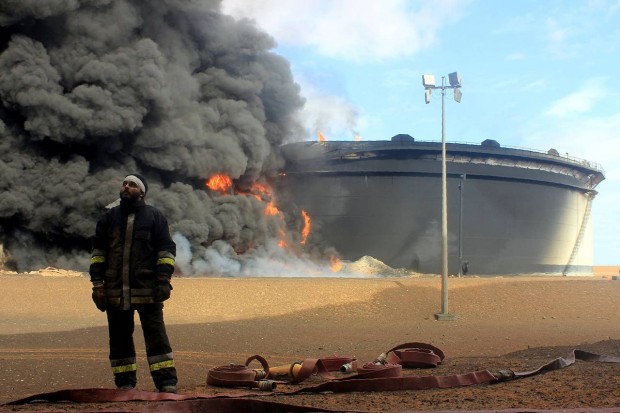Reports: Unrest in Libya paves way for incoming extremists

Wall Street Journal
Libya is emerging as a new destination of choice for extremists, as both Islamic State and al Qaeda have used the chaos since the overthrow of Moammar Gadhafi to seize territory and parts of the economy, a report by a security consulting firm said.
Wednesday’s report warned that Libya could become a dangerous new base for terrorist groups because of the country’s ungoverned hinterlands, long, porous borders and huge oil reserves.
Already, the absence of law and proliferation of weapons and violence in Libya “have allowed violent extremist groups such as the Islamic State and al Qaeda to thrive,” said the report by The Soufan Group, founded by a former U.S. government official who investigated the 2001 terror attacks.
The report noted that both groups “are both utilizing Libya as a safe haven from which to launch operations against neighboring countries.”
“Given geography, expansive territory, extensive oil reserves and its history with violent jihadist networks, a failed state in Libya could be disastrous for North Africa and Europe as well as the broader international community,” it said.
The warning echoes similar concerns among U.S. officials and comes as United Nations-backed efforts to patch together a unity government and restore order have fallen flat.
Last week at the World Economic Forum in Davos, Switzerland, U.S. Secretary of StateJohn Kerry listed several current crises, including those in Syria, Ukraine and Libya, as examples of places where corrupt or incompetent leaders helped to fuel violence and chaos.
On Monday, French Interior Minister Bernard Cazeneuve said Islamic State “has managed to seize passports in Iraq, Syria and Libya and to set up a true industry of fake passports.”
Since Gadhafi was killed in 2011, much of Libya’s territory has fallen under the control of a patchwork of militias, many of them warring. Today, there are two competing central parliaments and governments, one based in the capital of Tripoli and the other in the coastal city of Tobruk. Both are backed by loose alliances of armed groups and former rebels who helped topple Gadhafi.
This week the parliament in Tobruk, which has been internationally recognized, rejected the unity government proposed under the U.N.-backed plan. The Soufan report said the vote signaled that “despite high international hopes, rival parties in Libya simply do not have the incentive to compromise on power-sharing.”
The report said Islamic State and al Qaeda are shifting toward Libya partly because they are being squeezed out of places like Syria by international military coalitions.
Some Islamic State recruitment materials have even begun instructing aspiring foreign fighters to travel to Libya, rather than to Iraq and Syria. “As the group faces increasing military pressure on its strongholds in Raqqa and Mosul, this trend is likely to increase,” the report said.
Likewise, Libya has become a “lawless fallback position” for al Qaeda affiliates, which have also been pressured out of northern Mali and Algeria by French, Algerian and African Union troops.
The report said that al Qaeda and Islamic State have each been generating revenues in Libya. Islamic State has been attacking oil installations controlled by rival militia groups and seized three regions, one of which, Sirte, it has tried to promote as its Libyan capital, in the model of Raqqa in Syria and Mosul in Iraq.
“The black flag of the group adorns buildings across the city,” said the report. “Religious police patrol the city in pickup trucks, enforcing strict interpretations of religious law.”
How to submit an Op-Ed: Libyan Express accepts opinion articles on a wide range of topics. Submissions may be sent to oped@libyanexpress.com. Please include ‘Op-Ed’ in the subject line.
- Vessel with military vehicles redirected to Misurata - August 06, 2025
- Tetteh: Women’s participation key to a stable and just Libya - August 06, 2025
- UN warns of catastrophic fallout if Israel expands Gaza assault - August 06, 2025


